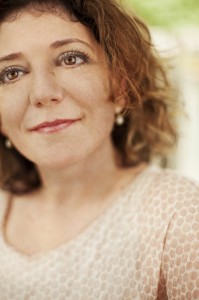Katie Steedly’s first-person piece [The Unspeakable Gift] is a riveting retelling of her participation in a National Institutes of Health study that aided her quest to come to grips with her life of living with a rare genetic disorder. Her writing is superb.
In recognition of receiving the Dateline Award for the Washingtonian Magazine essay, The Unspeakable Gift.
Enter your email here to receive Weekly Wide-Awake
MONDAYS ARE FREE #021 — #025

LANGUAGE. HISTORY. HUMOR.
EXERCISE 021: SPEAK ANOTHER LANGUAGE
a poem that embeds
Write a poem that embeds a language other than English inside of it.
“Bien dans sa peau.” She said.
Comfortable in your own skin.
“Bien dans sa peau.” She said.
I thought I understood. Then life.
“Bien dans sa peau.” She said.
Birth. Diagnosis. Education. Work. Die.
“Bien dans sa peau.” She said.
Falling apart. Back together. Falling apart. Back together. Falling apart. Back together.
“Bien dans sa peau.” She said.
The root. The bud. The root. The bud. The root. The bud.
“Bien dans sa peau.” She said.
Create. Emerge. Create. Emerge. Create. Emerge.
“Bien dans sa peau.” She said.
I am. I am. I am.
“Bien dans sa peau.” She said.
Miracles and sweetness. Miracles and sweetness. Miracles and sweetness.
“Bien dans sa peau.” She said.
Stars and scar tissue. Stars and scar tissue. Stars and scar tissue.
“Bien dans sa peau.” She said.
Wordlessness, Oneness, Forming. Wordlessness, Oneness, Forming. Wordlessness, Oneness, Forming.
“Bien dans sa peau.” She said.
We stand on the shoulders. We stand on the shoulders. We stand on the shoulders.
“Bien dans sa peau.” She said.
I love you. Do you know how much I love you? I love you. Do you know how much I love you? I love you. Do you know how much I love you?
“Bien dans sa peau.” She said.
You don’t have to carry that weight. You don’t have to carry that weight. You don’t have to carry that weight.
“Bien dans sa peau.” She said.
Ohm Shanti. Ohm Shanti. Ohm Shanti. Ohm.
EXERCISE 022: LEAN INTO UNCERTAINTY
some disorientation
Write a 15-line poem that corrects itself with every line.
What I wanted to say was, “I don’t trust you.”
So I said, “Here is my heart.”
What I wanted to say was, “You broke my heart.”
So I said, “I am sorry.”
What I wanted to say was, “I am beautiful.”
So I said, “I look fat in those pants.”
What I wanted to say was, “We are going to be alright.”
So I said, “Well, at least the Panthers are in the playoffs.”
What I wanted to say was, “I don’t want to understand cruelty.”
So I said, “Empathy is a strength.”
What I wanted to say was, “Not in my name.”
So I said, “Kilmar Abrego Garcia.”
What I wanted to say was, “Hands off.”
So I said, “Hold on.”
So I said, “Hold on.”
EXERCISE 023: DON’T HIDE YOUR DIALECT
we all speak very precise languages
I recently was about to start eating a meal during class, and a friend walked by and leaned down and said, “Like we say…” and then said a phrase in Arabic which in translation means, roughly, “enjoy your meal.”
It reminded me how we all speak very precise languages, and sometimes those languages are determined by country of origin or the countries of origin of our folks, but sometimes they’re determined by region or town or occupation or hobbies or dreams. Write a poem called, “Like we say” or “As we call it” in which you explore those precise phrases and languages in your own life.
Like we say, “Bless your heart.” “Bless your heart” — the bourbon of manipulation’s whiskey. “Bless your heart.” — What your grandmother says when you break one of her favorite dishes before bridge group. “Bless your heart” — F*** you very much, but in the nicest of ways. “Bless your heart.” — I see your kindness and generosity, but I am going to remember the time you told started dating Scoot when you knew I liked him in third grade. “Bless your heart” — I completely disagree with you and do not want you to see the dagger I will pull. “Bless your heart.” — Now, sit here and have some sweet tea while I make you feel awful. “Bless your heart.” — When you need a few seconds to catch your breath before knowing exactly how to respond to the polite and unmistakable jab. “Bless your heart.” — May you never have another moment’s rest, you heartless, lying dog. “Bless your heart.” — “I love you. Do you know how much I love you?”
EXERCISE 024: CREATE AN ORAL HISTORY
it’s been said
Yesterday, the focus was on what you and your kin say and how, precisely, it is said. Today, you’ll revise that same poem. (Save the original though!) Shift the perspective from first person collective to third person omniscient. Instead of “Like we say,” begin the poem and every subsequent line with “They say” or “It’s been said.” Playing with anaphora here will add a mythic flare to the idioms, superstitions, and speech patterns of your loved ones.
They say, “Bless your heart.” to keep the tea in the cup. They say, “Bless your heart.” to smell like magnolia and peony and honeysuckle. They say “Bless your heart” to keep it all crisp like fresh mown grass after rain. They say, “Bless your heart.” to measure twice and cut once. They say, “Bless your heart.” to be like a bow. They say, “Bless your heart.” to clean up a mess in life’s litter box. They say, “Bless your heart.” to remain fair to midlin’. They say, “Bless your heart.” to allow time for pupils to dilate in bright light. They say “Bless your heart.” to punctuate a sigh. They say, “Bless your heart.” because you should not leave the house without lipstick. They say “Bless your heart.” because you catch more flies with honey than you do with vinegar. The say “Bless your heart.” because conflict is not ladylike.
EXERCISE 025: HAVE A LAUGH
offer humor in an artful platform
. . . why not?
Transcribe a good and somewhat lengthy joke.
This exercise helped me determine I am not funny. I was immediately stumped and googled best jokes. I found Cosmopolitan’s “142 Funny Jokes Guaranteed to Keep You Giggling.” (A few of my favorites: Why do ghosts like to take the elevator? It lifts their spirits. What do you call a patronizing bear? A pan-duh. Why did the scarecrow win an award? He was outstanding in his field). Continuing my search. I talked with my husband — who confirmed humor is not my go to. He told me a joke from his childhood. “What is invisible and smells like bananas? A monkey fart.” I laughed at it all.
I laugh at other people’s jokes. I appreciate the relationship between intelligence and humor. I even like most stand-up (except stand-up that is racist-misogynistic, homo/transphobic, and lazy). I could be accused to trying too hard to be funny. (Truly funny people don’t have to try too hard.) Laughter is medicine for the soul. Finding humor is a skill and a blessing. Thank you for the opportunity to work out my humor muscles in the exercise. (Even if it did reveal a certain amount of atrophy!)
MONDAYS ARE FREE 001 — 003
MONDAYS ARE FREE 004 — 006
MONDAYS ARE FREE 007— 010
MONDAYS ARE FREE 011 — 015
MONDAYS ARE FREE 016 — 020
About Katie

From Louisville. Live in Atlanta. Curious by nature. Researcher by education. Writer by practice. Grateful heart by desire.
Buy the Book!
The Stage Is On Fire, a memoir about hope and change, reasons for voyaging, and dreams burning down can be purchased on Amazon.





